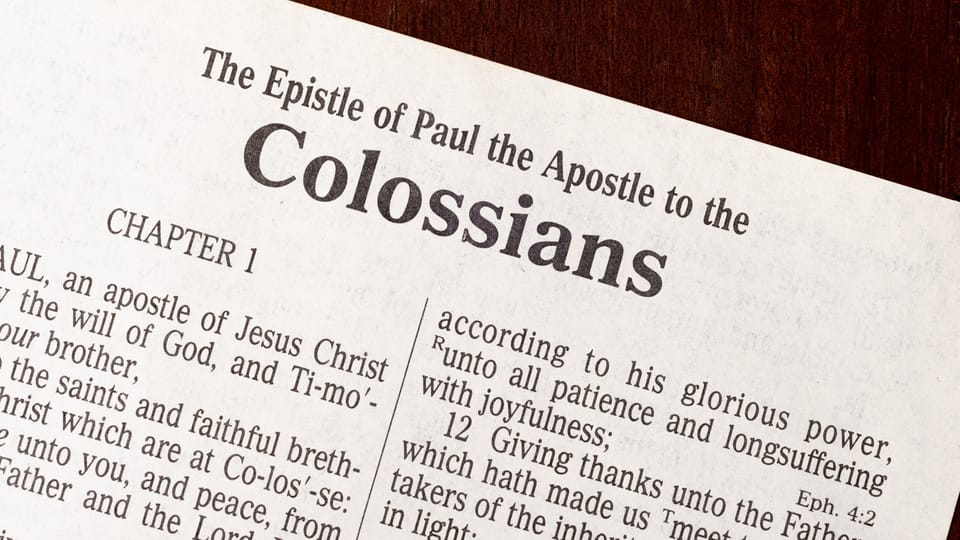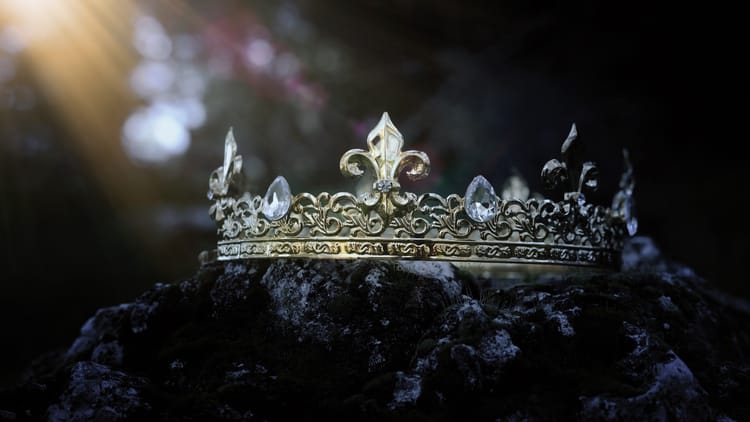All About Jesus (Colossians 1:15-22)

Are you interested in being a vegetarian, but concerned that you might not be able to adjust? Not to worry. You can become a flexitarian.
As vegetarianism gains in popularity and increases its market niche, a variation has developed. The flexitarian is a person who eats primarily vegetables, but also indulges occasionally with meat.
The designation fits people like 28-year-old Christy Pugh, who says, “I usually eat vegetarian. But I really like sausage.”
Christy says, “Sometimes I feel like I’m a bad vegetarian, that I’m not strict enough or good enough. I really like vegetarian food, but I’m just not 100 percent committed.”
A flexitarian – someone who loves, but isn’t 100 percent committed. I don’t want to sound negative, but I can relate to that description. That’s true of diets and resolutions. It’s true of even the things that mean the most to us – even in our commitment to Jesus.
It’s really not that we don’t love Jesus. The people I know are sincere in their desire to follow Jesus. The problem is that it’s not easy to live in a way that is completely committed. Somebody once wrote a song that said, “Prone to wander, Lord, I feel it; prone to leave the God I love.” These words were prophetic. Later in his life, he supposedly heard someone humming this song, and said, “I am the poor unhappy man who wrote that hymn many years ago, and I would give a thousand worlds, if I had them, to enjoy the feelings I had then.”
A man named Ron Sider has just written a book called The Scandal of the Evangelical Conscience. He’s documented on a macro level what we experience on a personal level, and the results aren’t pretty. He quotes one theologian, “evangelical Christians are as likely to embrace lifestyles every bit as hedonistic, materialistic, self-centered, and sexually immoral as the world in general.” Divorce is now more common among “born-again” Christians; only 6 percent of evangelicals tithe. There are all kinds of statistics that show that our love for Christ doesn’t always translate well into reality.
Sider writes, “By their daily activity, most “Christians” regularly commit treason. With their mouths they claim that Jesus is Lord, but with their actions they demonstrate allegiance to money, sex, and self-fulfillment.”
That isn’t easy to read. I don’t mean to be negative. But I think we need to be honest that things aren’t going as well as we might think. What we believe and who we trust isn’t always making the difference we would think in how we live. On a personal level, and on a macro level, we love Jesus, but we’re not always one hundred percent committed.
Treasonous Letter
That’s one of the reasons why I want to look at an ancient letter from almost two thousand years ago. At first glance, you may ask what a two-thousand year letter has to say to us today. Good question. The recipients of this letter lived at a completely different time and place. When we read this letter, it’s not easy to see how their world relates to ours.
Reading the letter doesn’t help right away either. It’s like hearing one side of a telephone conversation. In this case, it’s even trickier, because the end we hear is set in a completely different culture. So what does this letter have to do with us?
The short answer is this: like us, the Colossians loved Christ, but weren’t one hundred percent committed. They lived in a small city and followed an obscure religion. They were facing lots of the same pressures that we face today. Paul writes a letter to set some things straight. In doing so, he pens a letter that was treasonous in his day – and equally treasonous in today’s context.
It wasn’t easy to follow Christ in Colosse. It was okay to worship a god, and it was okay to worship Jesus. People worshiped many deities. Then, like now, it was considered wrong to insist that your god was better than others. They faced the same pressure that we do. It’s not at all wrong to worship Jesus. It’s okay as long as you don’t claim that Jesus is better than any other religion. Their world was a lot like ours – a pluralistic world in which Christians were considered narrow and intolerant.
I don’t mean to say that Christians aren’t guilty of intolerance. Sometimes we are. But believing that Jesus is the Son of the one true God is a Biblical notion – and one that doesn’t play well in today’s world. We face pressure to soften this belief, and so did the Colossians.
Every week, we face incredible pressure to conform to the world system. The average North American is confronted with between five to twelve thousand corporate images every day. It’s not that all of these images are bad – they aren’t. It’s just that they’re absorbed into our way of thinking. We’re bombarded with them so much that we don’t even notice them after a while. We soon begin to think the way that every one else things.
When we read the Bible, it begins to look a little out of step with our world. It makes claims that seem a little bold. I think that’s one of the reasons why we face the struggle I mentioned a minute ago: it’s not that we don’t love Jesus; it’s just that it’s hard to be a hundred percent committed in today’s world. There are too many pressures.
That’s where the book of Colossians comes in. This is exactly the same situation the Colossians were facing. They were exposed to all kinds of other gods. They felt the same pressures to accept other belief systems as equally valid. They didn’t face corporate images, but everywhere they turned they faced images of Caesar – in the gym, at festivals, and all of their institutions. Caesar was taken to be the son of God, the savior and lord, who brought peace and prosperity to the world.
Paul writes a letter and names names. He essentially commits an act of treason against the empire of the day. He takes on the world system of that day. He takes every claim of the empire and turns it on his head. This is radical stuff.
If Paul was writing to us, he wouldn’t be taking on Caesar. He would identify those things in our lives that call for our allegiance and attention. He wouldn’t be committing an act of treason against Caesar. He might name other names. He would insist that Microsoft and Wal-Mart and the President of the United States aren’t the ones in charge. He would challenge the values that we’ve accepted that are just part of our culture. He would challenge the values and the lifestyles that we embrace. What would he take on? Maybe our perpetual shopping, our consumption, the way that we imagine and think. He may challenge the way that we see faith and life as separate; the way we divide “faith from life, church from culture, theology from economics, prayer from politics and worship from everyday work” (Walsh and Keesmaat, Colossians Remixed).
Some think that we are “more enculturated, more taken captive by culture, more comfortable in the empire, than that radical group of young converts in that first century” (Walsh and Keesmaat).
Listen to how two authors express Paul’s words today in the book Colossians Remixed:
In an image-saturated world,
A world of ubiquitous corporate logos
Permeating your consciousness
a world of dehydrated and captive imaginations
in which we are too numbed, satiated and co-opted
to be able to dream of life otherwise
a world in which the empire of global economic affluence
has achieved the monopoly of our imaginations
in this world
Christ is the image of the invisible God
In this world
driven by images with a vengeance
Christ is the image par excellence
The image above all other images
The image that is not a fa‡ade
The image that is not trying to sell you anything
The image the refused to co-opt you
Christ is the image of the invisible God…
Paul would say that it’s time to end our cultural captivity, and our willingness to separate Christ from the way we live. So he pens a poem that takes on the empire – not just Caesar’s empire, but the empire of the world in which we live today.
A Portrait of Christ
So Paul takes on the empire, but he does it in a different way that you would think. He does it by establishing exactly who Jesus is. He paints a portrait of Jesus Christ, the man who walked the earth just thirty years before these words were written. This is one of the richest descriptions of Christ in all of the Bible. Someone has called it a full-length portrait of Christ. He proclaims Jesus to be Creator, Redeemer, and Lord of all creation, including the empire. It’s all about Jesus. He is the one who holds everything together, who answers life’s ultimate questions. He says that Christ is not one of many gods; he is the one through whom the whole universe was made. All of God’s purposes for this world are fulfilled in Christ.
This is important for us. We might not think that the way to fight our cultural captivity would be to focus on Christ. According to Paul, this is the way. When we truly understand who Jesus is, it really does make a difference in how we see the world, and how we live.
Paul paints a portrait of Christ from three perspectives:
Christ in Creation
We tend to see the universe from a scientific perspective. I love seeing images beamed back from space of the planets. Scientists are finding stuff out about this universe that boggle the mind. I was sent pictures of some marine life that was washed onto shore after the tsunami in South Asia – absolutely amazing. It’s easy to be put in awe by the universe and all that we’re learning. It’s much harder to remember, as Paul says, that Jesus is the originator of this world, and the one who holds it all together.
Paul writes:
Christ is the visible image of the invisible God. He existed before God made anything at all and is supreme over all creation. Christ is the one through whom God created everything in heaven and earth. He made the things we can see and the things we can’t see–kings, kingdoms, rulers, and authorities. Everything has been created through him and for him. He existed before everything else began, and he holds all creation together. (Colossians 1:15-17)
Back then, they saw all kinds of deities behind creation. Today, we’re more prone to see no God behind creation. We may see God as Creator, but think that he keeps an arms-length away from the laws that govern this universe. Paul corrects all these views by stating that Jesus is the one who created everything, is supreme over everything, and who not only got everything started, but holds it all together. The only reason there is such a thing as the law of gravity is because Jesus is the one who makes gravity happen at every minute. If he took a break, everything would fall apart and cease to exist. He keeps the cosmos from becoming a chaos. He is the creator and sustainer of this world and everything in it.
This really does influence how we see everything. Jesus is not some impersonal force removed from everyday life. He is not at the mercy of the laws of nature. He is intimately involved with every atom of this universe. There is nothing outside of his purview or control. He is behind and above everything.
Christ as New Creator
It’s not hard to see that all is not well in this universe. As much as we are put in awe of creation, we also see tsunamis and mudslides and tornadoes. Our bodies suffer from diseases. We live in a broken world.
On a personal level, we see that all is not well. We live in a world with wars and conflicts. We are often victims of decisions we make, and yet we find it hard to break out of old and destructive patterns. Sure, Christ is creator, but what is he doing about the condition of the world we live in?
Paul writes:
Christ is the head of the church, which is his body. He is the first of all who will rise from the dead, so he is first in everything. For God in all his fullness was pleased to live in Christ, and by him God reconciled everything to himself. He made peace with everything in heaven and on earth by means of his blood on the cross. (Colossians 1:18-20)
Theologians talk about four stages of this world: Creation – Fall – Redemption – Restoration. We see Creation, although we see it broken by the Fall. We see pretty clearly what the Fall has done to this world. We see evidences of the Fall all around us. Paul goes on to describe what Christ is doing know. He’s redeemed us – Paul says as much earlier in the chapter, in verses 13 and 14. Redemption doesn’t mean much to us now, but they would have understood it as the language of slavery. A slave would be redeemed by a payment that would allow freedom. The nation of Israel was set free from slavery in Egypt in the exodus. Paul says that this is what Jesus is doing: giving freedom to his people. He’s redeeming, and he’s also going to restore everything to its right condition.
We see evidence of Creation and Fall all around us. Paul points us past these, to see Redemption and Restoration. Jesus is making all things new. He will one day make this world a tsunami-free zone. He is making peace with everything in creation. He is making all things new.
Christ As Involved With Us
This is all lofty language. Paul emphasizes that Christ is not only the creator of the universe, the head of the church, and exalted in all things, but he is also actively present among you. You are case studies of what Jesus is doing around the world. Paul writes:
This includes you who were once so far away from God. You were his enemies, separated from him by your evil thoughts and actions, yet now he has brought you back as his friends. He has done this through his death on the cross in his own human body. As a result, he has brought you into the very presence of God, and you are holy and blameless as you stand before him without a single fault. (Colossians 1:21-22)
You are an example of what Christ is doing. He has personally intervened in your life and made peace between you and God. He has made imperfect people into holy and blameless people. You may not feel holy and blameless, without a single fault. I could ask your closest friends and family members and they would be able to point out a fault here and there. Before God, because of what Jesus has done, you are in fact holy and blameless. You have been given all of Christ’s righteousness in exchange for all of your sin.
When we begin to see Christ like this – as creator, new creator, as involved with our very lives – it will change the way we live. It will make us his subjects. We will see the empire for what it is – hollow and empty and under Christ. Like the story, The Emperor’s New Clothes, we’ll see that things aren’t what they appear. Christ is in charge. He is above and behind everything. It’s all about him.
Paul finishes this section by challenging the Colossians to live differently as a result of this portrait of Christ:
But you must continue to believe this truth and stand in it firmly. Don’t drift away from the assurance you received when you heard the Good News. The Good News has been preached all over the world, and I, Paul, have been appointed by God to proclaim it. (Colossians 1:23)
I love this. Don’t see this portrait of Christ and walk away unchanged. Let this portrait change everything about you from the inside out. Refuse to be co-opted by this world. Let your life be about Christ. Recognize him in all his glory. Be all about him.
Paul is going to unpack what this means for us in the rest of the letter. My challenge to us is the same as Paul’s challenge to the Colossians: let this knowledge change you. Let the church live up to this knowledge of Christ. Let’s make sure that our worldview is shaped by who Christ is so that we really are not just in love with Jesus, but also committed.
When apartheid was still official government policy in South Africa, a young evangelical was smuggled into an underground communist cell. All they had in common is that they were all opposed to apartheid. The communists asked the evangelical, “Tell us about the Gospel of Jesus Christ.” The young evangelical gave a clear presentation, as best he could, of who Jesus is and what it means for us. He talked about the personal transformation that takes place. He talked about the how Christ creates new bodies of believers, in which people from all races and backgrounds become one. One of the members of the communist group said, “That’s wonderful! Show me where this is happening.” The evangelical paused; he couldn’t think of one place in South Africa. “Then the whole thing is s***,” said the communist.
“Show me one place where this is happening.” My prayer is that we will see Christ so clearly that we will stop being flexitarians, and that we will actually live as if we believe Christ is behind and above everything. I pray that we’ll be different because we see who Jesus really is.
Prayer
Let us see Jesus. Let us be all about him. Help us to see him more clearly than we do the powers of this world.
Help us to draw out the implications of who Jesus is in every area of our lives. Amen.





